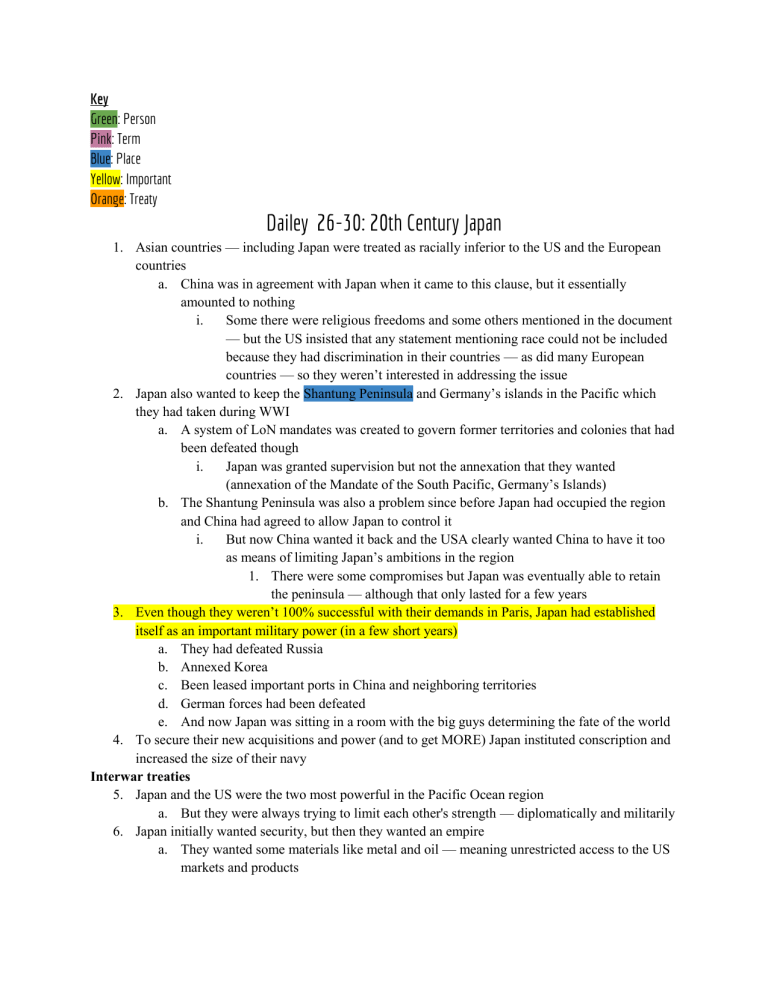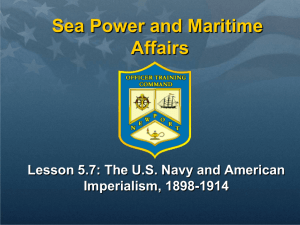20th Century Japan: Military Power & Treaties
advertisement

Key Green: Person Pink: Term Blue: Place Yellow: Important Orange: Treaty Dailey 26-30: 20th Century Japan 1. Asian countries — including Japan were treated as racially inferior to the US and the European countries a. China was in agreement with Japan when it came to this clause, but it essentially amounted to nothing i. Some there were religious freedoms and some others mentioned in the document — but the US insisted that any statement mentioning race could not be included because they had discrimination in their countries — as did many European countries — so they weren’t interested in addressing the issue 2. Japan also wanted to keep the Shantung Peninsula and Germany’s islands in the Pacific which they had taken during WWI a. A system of LoN mandates was created to govern former territories and colonies that had been defeated though i. Japan was granted supervision but not the annexation that they wanted (annexation of the Mandate of the South Pacific, Germany’s Islands) b. The Shantung Peninsula was also a problem since before Japan had occupied the region and China had agreed to allow Japan to control it i. But now China wanted it back and the USA clearly wanted China to have it too as means of limiting Japan’s ambitions in the region 1. There were some compromises but Japan was eventually able to retain the peninsula — although that only lasted for a few years 3. Even though they weren’t 100% successful with their demands in Paris, Japan had established itself as an important military power (in a few short years) a. They had defeated Russia b. Annexed Korea c. Been leased important ports in China and neighboring territories d. German forces had been defeated e. And now Japan was sitting in a room with the big guys determining the fate of the world 4. To secure their new acquisitions and power (and to get MORE) Japan instituted conscription and increased the size of their navy Interwar treaties 5. Japan and the US were the two most powerful in the Pacific Ocean region a. But they were always trying to limit each other's strength — diplomatically and militarily 6. Japan initially wanted security, but then they wanted an empire a. They wanted some materials like metal and oil — meaning unrestricted access to the US markets and products b. But the US was not interested in war in Asia (as it would be very expensive and guys we literally just had a war let’s calm down a bit thanks) i. But they wanted security for the Philippines (also Hawaii and Guam) — this was like their main colony (the Philippines which is hard to spell) 1. And the US also wanted access to Chinese markets c. And the Japanese were trying not to provoke the US because it would be bad for them economically i. But Japan was involved with China who was politically unstable — and there were many investments and military units to protect them Japan’s interwar foreign policy 7. Pressure for Japan to have a strong military after the first world war — maintain its strength and maybe even expand its size a. They wanted to protect their annexed lands (lands in Taiwan, Korea and the Shantung Peninsula + islands that were now supervised as LoN mandates) from foreign states b. And they wanted more land so their economy would be nice — the military did, they thought more land should be brought under Japanese control as this would help the economy of the country i. And the military (the army and navy) had positions in the cabinet so they had to be appeased or else they might bring down the government c. Civilian ministers knew that large militaries were expensive though and that Japan was economically vulnerable i. many wanted to expand the empire but they had to sort of tiptoe around the US and European states (especially when it came to China) because a fallout with them would hurt real bad economically 1. As their economy relied on exports 8. The government's foreign policy (called the Shidehara Diplomacy after Japanese Foreign Minister Kijuro Shidehara of the 20s and 30s) had a balancing act where the military (especially army) was well maintained and Japan’s gov. worked to reassure foreign gov.s that Japan was not a threat to China and had no desire for further expansion a. Shidehara Diplomacy would collapse with the Mukden Incident in 1931 Washington Naval Conference and treaties 1921-2 9. Reduction of armaments at the end of the war 10. The US, Japan and Britain had large fleets because of the war though a. US didn’t want to keep building and maintaining to defend its trade and possessions in the Pacific though and they invited B and J to discuss naval matters and limitations i. Created the Five Power Treaty: 1. Large battleship construction halted for 10 years 2. Some ships would be scrapped — certain battleships and cruisers — a fast type of warship 3. Every five capital ships the US or B got, J only got 3 a. Therefore only 60% of the size of either the USA or Britain 4. B and US agreed to build no fortifications in the Pacific besides Pearl Harbor (which was the main naval base for the USA) 11. The Four-Power-Treaty and the Nine-Power-Treaty were also signed in DC in 1922 a. Four power ended Anglo-Japanese Alliance and required that J, F and the US respect each other's territories b. Nine-power required J to move its military from the Shantung Peninsula and all nations had to respect China’s independence and borders 12. Japan’s military believed that a fleet 60% the size of the US's was inadequate for defense a. But the Japanese gov. was mostly relieved by the decisions made in Washington i. Japan’s economy could not support the building and maintenance of a huge military in the post-WWI economic crisis ii. The gov. also believed that its foreign policy would be more successful if it was conciliatory and worked through negotiations and compromise during this period 1. It was not in Japan’s interest to antagonize their main trading partners (no duh) London Naval Conference 1930 13. Every got together again in 1930 to review the naval agreements and bitch about the depression (meaning Britain, the USA and Japan) a. They were all beginning to feel the great financial stress of the depression i. So no one wanted an arms race (which would be expensive and probably in the form of ships) ii. Except Japan was getting a little aggressive (rude) — their navy was 1. They insisted they should be allowed 70% of the tonnage of either the US or British fleet a. In a compromise they achieved 69.75% ratio on battleships, but cruisers remained at 60% b. The government of Japan supported this — the navy didn’t though i. They threatened to bring down the gov. ii. The genrō (translated to ‘elder statesman’) Saionji ordered the Privy Council to remove the objecting ministers and approve of the treaty (and this was done_ iii. But then in response to the signing of the London Naval Treaty of 1930, Japan’s prime minister was shot by an ultranationalist assassin — the pm survived initially but died from his wounds a couple months later 14. On the Genrō: a. ‘Elder statesman’ — these men were initially those who created the Meiji Constitution i. As they aged they appointed others ii. Saionji was the most powerful of them — it was he who appointed prime ministers in the name of the emperor b. The genrō had direct access to the emperor and it was assumed that they spoke for the emperor and with his authority c. But as Saionji aged he didn’t participate as much and the military was able to assume increasing control over the state until 1936 (when most governmental policy was determined according to the military and its needs) Military expansion 15. J’s army and navy were reduced during the 20s as J suffered an economic crisis (a series of them) 16. By the end of the 20s various factions within the military and in civilian political parties were calling for an increase in military spending (for both offense and defense) a. As Japan wanted to defend their interests in Manchuria but they also wanted to resolve some domestic issues i. Domestic issues like a lack of resources and food supply 17. Expansion into Manchuria would come at the expense of China who was vast but weak Increased spending 18. Shipbuilding was limited because of treaties — including battleships, cruisers and aircraft carriers a. But the army had no limitations in terms of international obligations i. Well maybe some from the government because they were like we can’t afford nice things like a big ass military 1. The House of Representatives and various ministers believed that a massive military was an expense that Japan could not afford due to the financial crisis of the 1920s b. But with the growth of military power in Japan’s gov. (probably due to the fact that the genrō were getting old) army expenditure and expansion increased i. Increased spending on the military in the early 1930s was one way the gov. stimulated economic recovery from the Great Depression ii. Shipbuilding steel and rubber (and other military-related industries) massively increased production 19. Essentially, the military was a part of the government and they said fuck you and expanded anyway and then there was some economic recovery and suddenly everything was expanding

